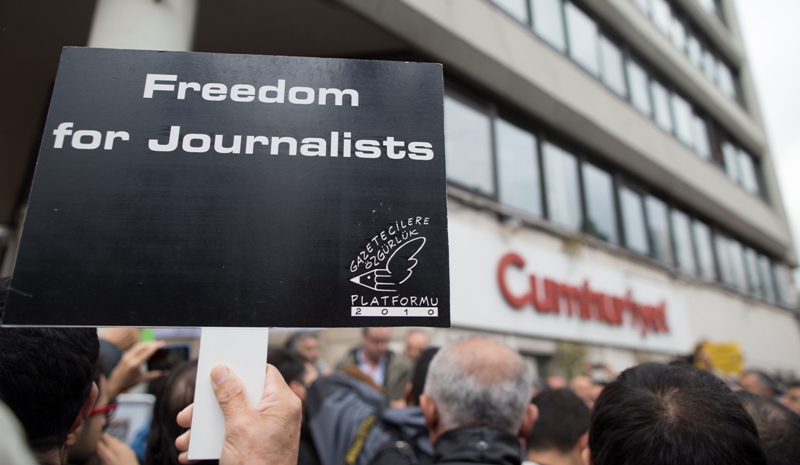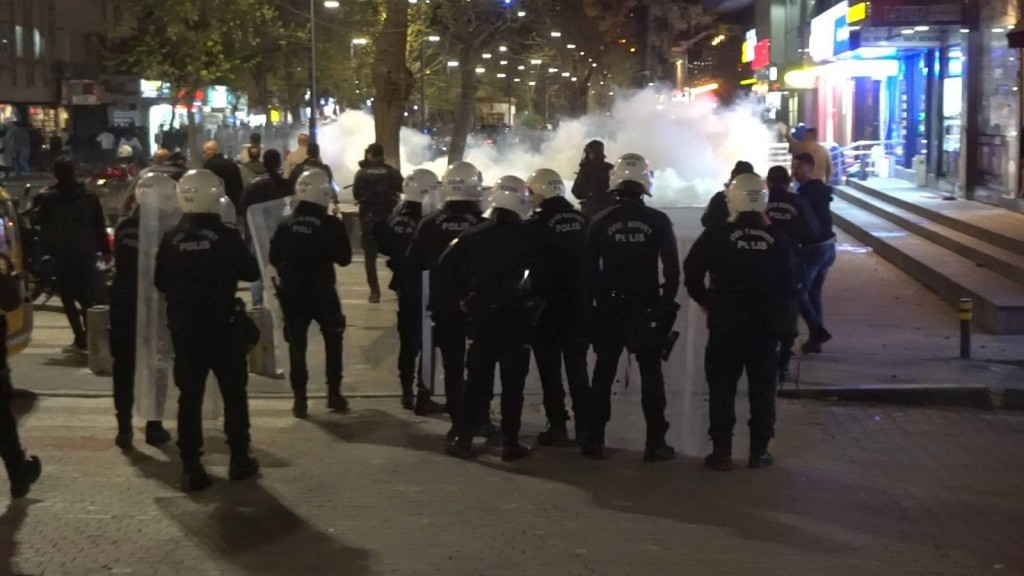The groups made the call as they launched an international appeal during a press conference this morning at the headquarters of the Journalists Association of Turkey (TGC) in Istanbul.
Dündar and Gül were arrested on Thursday and placed in pre-trial detention on charges of aiding a terrorist organisation, espionage and disclosure of classified documents. The charges stem from a report published in Cumhuriyet that purportedly revealed evidence that Turkey’s intelligence agency, MIT, was secretly sending weapons to Islamist rebel groups in Syria.
Turkish authorities have alleged that weapons found in Syria-bound trucks owned by the MIT were planted by followers of a movement headed by Muslim cleric Fethullah Gülen in bid to undermine support for Turkey’s Justice and Development Party (AKP)-led government. Authorities labelled the movement a terrorist organisation following a rift between movement adherents and their former allies in the AKP, and officials claim that Dündar and Gül acted to further the movement’s aims.
In related news, Cumhuriyet said today that the government had opened an investigation into its tax accounts from 2010, which the daily said came more than two years after authorities closed a previous inspection into that year’s accounts. Additionally, a court dismissed Dündar and Gül’s objection that their arrest was unconstitutional and violated human rights principles.
Only 10 days before his arrest, Dündar, together with the head of Cumhuriyet’s executive board, Akın Atalay, had attended the ceremony of the Council of Europe’s World Forum for Democracy in Strasbourg, where he accepted the 2015 RSF Press Freedom Prize on behalf of Cumhuriyet.
“The Turkish authorities are targeting the wrong enemy,” RSF Secretary General Christophe Deloire said today at the press conference. “The judicial system seems to prosecute journalists more often than the accomplices of [the Islamic State group]. Turkey is a great country, with democratic institutions and a very open civil society. We appeal to the government, as a matter of honour, to restore all the conditions of pluralism, starting with freedom for journalists.”
TGC President Turgay Olcayto added: “With globalization, the Turkish media’s problems could one day become the problems of western journalists. It is vital that we join forces to defend free journalism before it is too late.”
IPI joined other organisations signing the appeal, including RSF, the Committee to Project Journalists (CPJ), the World Association of Newspapers and News Publishers (WANIFRA), the World Press Freedom Committee (WPFC), the International Federation of Journalists (IFJ), the European Federation of Journalists (EFJ), the Ethical Journalism Network (EJN), the TGC and the Union of Journalists of Turkey (TGS).
The chair of IPI’s Turkey National Committee, Kadri Gürsel, also took part in today’s press conference.
“The EU’s legitimate pressure on Ankara had played a positive role in the past in order to free our imprisoned colleagues,” he told media representatives. “However, this time, we paradoxically see that the EU’s neglect and disregard toward the regime’s repression of freedom of the press – particularly by imprisoning journalists like Can Dündar and Erdem Gül – is playing a negative role in making Turkey’s press freedom deficit even bigger. Ankara’s refugee-crisis blackmail of the EU has worked and has freed its hands to limit more remaining liberties in the country.”
Gürsel continued: “The EU which practically treats Turkey as a neighbouring country and not a candidate, deserves its own share own negative recognition for this degradation. This short-term-interest-based approach will not make Turkey a good neighbour of the EU; on the contrary, it will be worse one.”
The international appeal unveiled today calls not only for the release of Dündar and Gül, but also for the release of other journalists unjustly detained in Turkey.
The general public can support the appeal by signing a related petition on RSF’s website, which is available in English, Turkish or French.
The full text of the international appeal and a list of signatories appear below.
***************************************************************
PRESIDENT ERDOGAN, FREE CUMHURIYET’S EDITORS AND ALL OTHER DETAINED JOURNALISTS!
First as prime minister and now as president, Recep Tayyip Erdoğan has been waging a methodical crackdown on the media in Turkey for years. Erdogan is persecuting journalists of all colours in an increasingly ferocious manner in the name of combating terrorism and defending state security. The Erdogan regime’s arrests, threats and intimidation are unworthy of a democracy.
Can Dündar, the editor-in-chief of the Turkish daily Cumhuriyet, and his Ankara bureau chief, Erdem Gül, have been held since the evening of 26 November. They are charged with spying and terrorism because last May they published evidence of arms deliveries by the Turkish intelligence services to Islamist groups in Syria. Both are exemplars of journalism, the search for truth and the defence of freedoms. President Erdogan publicly said that Dündar “will pay for this.” But Cumhuriyet’s journalists just did their job, publishing information that was in the public interest.
At a time when international terrorism is at the centre of everyone’s concerns, it is unacceptable that political prosecutions are used to suppress investigative reporting and exposés. The arrest of these two journalists is the latest extreme to which political use of the Turkish judicial system has been taken. Many journalists have been detained on spurious charges of terrorist propaganda and insulting President Erdogan. The regime has also been using economic levers to put growing pressure on the media, while draconian laws have been passed.
We, public figures, media freedom NGOs and unions, reject the blatant erosion of media freedom in Turkey. The country is ranked 149th out of 180 countries in the Reporters Without Borders press freedom index.
We appeal to the Turkish authorities to free Can Dündar and Erdem Gül without delay, to drop all charges against them, and to free all other journalists who are currently detained in connection with their journalism or the opinions they have expressed.
We also urge the institutions and governments of democratic countries to face up to their responsibilities to respond to President Erdoğan’s increasingly authoritarian excesses.
FIRST SIGNATORIES:
NGOs:
Reporters Without Borders (RSF)
Committee to Project Journalists (CPJ)
International Press Institute (IPI)
World Association of Newspapers and News Publishers (WANIFRA)
World Press Freedom Committee (WPFC)
International Federation of Journalists (IFJ)
European Federation of Journalists (EFJ)
Ethical Journalism Network (EJN)
Turkish Association of Journalists (TGC)
Turkish Union of Journalists (TGS)
Public figures:
Günter Wallraff, journalist, Germany
Noam Chomsky, linguist, USA
Edgar Morin, sociologist, France
Carl Bernstein, journalist, USA
Zülfü Livaneli, writer, Turkey
Ali Dilem, cartoonist, Algeria
Thomas Piketty, economist, France
Claudia Roth, politician, Germany
Paul Steiger, journalist, United States
Kamel Labidi, journalist, Tunisia
John R McArthur, media executive, USA
Fazil Say, pianist, Turkey
Peter Price, media executive, USA
Edwy Plenel, media executive, France
Jim Hoagland, journalist, USA
Ahmet İnsel, political analyst, Turkey
Eric Chol, newspaper editor, France
Nedim Gürsel, writer, Turkey
Cem Özdemir, Green Party co-president, Germany
Hakan Günday, writer, Turkey
Mikis Theodorakis, composer, Greece
Per Westberg, writer, Sweden
Louise Belfrage, journalist, Sweden
Ali Anouzla, journalist, Morocco
Omar Bellouchet, journalist, Algeria
Jack Lang, former government minister, France
Omar Brouksy, journalist, Morocco
Pierre Haski, journalist, France
Jay Weissberg, cinema critic, USA



